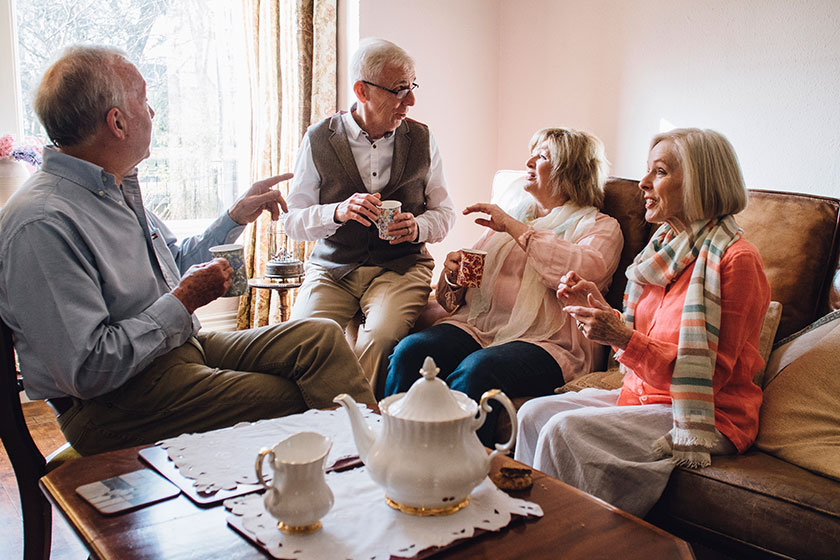Support groups in senior homes play a critical role in enhancing the well-being of older adults. These groups provide a safe space for residents to share their experiences and find comfort among peers who understand their struggles.
From coping with grief to managing chronic illnesses, support groups address various challenges faced by residents. Here are five essential types of support groups commonly found in homes.
Grief Support Groups
Losing loved ones is a profound and deeply personal experience, and the grieving process can feel isolating, particularly for residents who may have outlived many friends and family members. Grief support groups in senior homes provide a safe and compassionate environment for individuals to process their emotions and come to terms with their loss.
These groups offer a space where residents can share their feelings, memories, and thoughts with others who have faced or are currently facing similar losses.
The value of these groups lies not only in emotional expression but also in the validation that comes from hearing others share similar stories. Often, the simple act of talking about a loved one—recounting fond memories, sharing the pain of loss, or expressing fears about the future—can bring about a sense of comfort and relief. Many participants find solace in knowing they are not alone in their journey, and they are permitted to grieve in their own way, at their own pace.
Chronic Disease and Condition Support Groups
Living with chronic health conditions, such as heart disease, diabetes, or arthritis, can significantly impact one’s quality of life. For many residents, managing these long-term health issues involves a combination of medical treatments, lifestyle adjustments, and emotional resilience. Chronic disease and condition support groups serve as a valuable resource, offering a platform for individuals to share coping strategies, seek advice, and receive emotional support.
These groups enable residents to discuss their day-to-day challenges in managing symptoms, adhering to treatment plans, and maintaining a healthy lifestyle despite the limitations imposed by their conditions. Participants often exchange practical tips on topics like nutrition, exercise, medication management, and pain relief techniques. Importantly, these groups provide emotional support by allowing members to express their frustrations, fears, and concerns in a non-judgmental space.
Dementia-Related Support Groups
Dementia is a complex condition that impacts both the individuals diagnosed and their caregivers. For families and caregivers, watching a loved one face cognitive decline is both emotionally painful and practically challenging. Dementia-related support groups are designed to address the needs of both those living with dementia and their caregivers, providing a shared space to discuss the difficulties, emotions, and experiences associated with this condition.
For individuals diagnosed with dementia, support groups offer a setting where they can discuss their experiences with cognitive decline in a supportive environment. These groups foster connections between participants, allowing them to share their thoughts on coping with memory loss, managing confusion, and maintaining their sense of dignity. Hearing from others who understand the complexities of dementia can be deeply comforting, as it reassures individuals that they are not alone in their experiences.
Addiction Recovery Support Groups
Substance abuse and addiction are growing concerns among older adults, often stemming from issues such as chronic pain, loneliness, or depression. Addiction recovery support groups provide a non-judgmental and safe environment where individuals can openly discuss their struggles with addiction and seek the guidance and encouragement they need to begin their recovery journey.
Recovery from addiction can be especially challenging in later life, as older adults may feel a sense of shame or embarrassment about their substance use. Addiction recovery support groups work to break down these barriers by fostering an atmosphere of acceptance and understanding.
Emotional Support Groups
Aging brings about a range of significant life transitions, from retirement to changes in physical abilities and social relationships. Emotional support groups offer residents a space to process these transitions and share their emotions with others who may be facing similar challenges.
Whether it’s adjusting to life in a senior home, coping with feelings of loneliness, or finding new purpose after retirement, these groups provide a nurturing environment where participants can express their feelings openly. Group members often find comfort in knowing others are grappling with the same life changes, fostering a sense of belonging and community.
Support groups in senior homes offer vital assistance to residents facing various challenges. From grief to chronic illness, these groups provide comfort, practical solutions, and emotional relief. By offering a space for shared experiences, they help foster connection and understanding among residents.
At our Independent Living community, we take pride in offering exclusive programs, activities, and events that support the well-being of all our residents. We invite you to explore the ways we can help enrich your lifestyle and provide the support you need.







